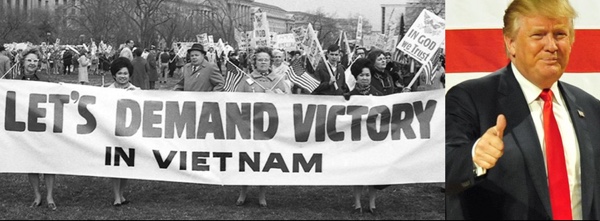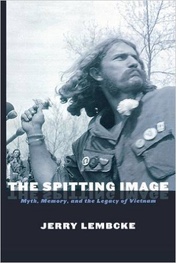Trump Is the Price We’re Paying for Our Lost Wars

Fundamentalist demonstrators march at the Washington Monument in support of the Vietnam War in 1970. Tom Norpell
In a June 16 opinion column Bill Moyers and Michael Winship lay bare the historical ties between Joe McCarthy and Donald Trump. I doubt that I’m alone in saying—“I had no idea”—upon learning that McCarthy henchman Roy Cohn was the bridge between those generations of the ultra-right Republicans having also worked for Donald’s father, Fred, and mentored Donald. With the deep appreciation for history that I have, I’m grateful for the punctuation that Moyers and Winship put on the dangers we face with a Trump presidency.
 But Moyers and Winship could have gone
even further. The historical context providing common ground for
McCarthy and Trump is the same ground out of which grew German
Nazism, the twentieth-century’s most virulent strain of political
unreason: lost war.
But Moyers and Winship could have gone
even further. The historical context providing common ground for
McCarthy and Trump is the same ground out of which grew German
Nazism, the twentieth-century’s most virulent strain of political
unreason: lost war.
The German case is well known and well-studied. With its expansionist plans stymied by defeat in World War I, Germany turned inward to find the reasons for its loss. Jews and communists were cast as the treasonous fifth-columnists responsible for having stabbed in the back the military mission; a failure of German will-to-war was laid at the feet of homosexuals and women. A “dark age of unreason” befell the nation, during which home-front wounds to Aryan racial pride and anxieties about economic uncertainties grew into a vengeful Nazi movement. It was in this mood of popular rancor that a revanchist military establishment sought the restoration of its glory through rearmament that put Germany on the path leading to World War II.
The United States did not lose World War II but McCarthyism found fertile ground in the war’s aftermath. The European war, having been won on the Eastern Front, bequeathed to the communist Soviet Union an enormous prestige and no small amount of territorial influence. The communist movements in Western Europe had been bulwarks of resistance to fascism from Spain in the late 1930s through the war years of the 1940s, emerging from the war strongly positioned to lead labor unions and political parties in a socialist direction that threatened U.S. dominance in the region. The Chinese revolution of 1949 and the emergence from the war of strong communist movements in Southeast and Northeast Asia posed even greater dangers to U.S, interests. Indeed, the slogan around which McCarthyism mustered its support—“Who Lost China?”—had nothing to do with World War II victories over fascism and everything to do with the post-war losses to communism.
Like fascism in inter-war Germany, McCarthyism was a witch hunt for those responsible for the losses abroad that threaten the established order at home. Before McCarthy was destroyed by his own excesses—as Moyers and Winship recount—communists, and some liberals who supported their rights to free speech and employment, were hounded from labor unions, universities, and the government.
Enter Vietnam. Like Germany’s loss in WWI that gave rise to Nazism, and the post-WWII challenge to U.S. hegemony by communism that fueled McCarthyism, the loss of the war in Vietnam is the backstory to the sour national mood that Trumpism now exploits. Unable to accept the truth of its defeat to a small outgunned nation of Asian-others, the pro-war U.S. right spun a betrayal narrative for the loss of the war in Vietnam: the military mission was sold-out by radical communists in the streets and universities, liberals in congress, and a feminizing of the culture that sapped the will-to-war. The perception of a new-world order in which the U.S. was vulnerable to powerful, if unseen, global forces fed a fearful anxiety that ran, in some evangelical religious communities, to conspiratorial end-of-time fantasies—a “dark age of unreason,” indeed.
This is the narrative that found willing listeners in the cars lined up for gas during the OPEC oil crisis of the 1970s, the plant closings in the steel and auto industries in the early 1980s, and the farming communities devastated by foreclosures after that. It is this storyline of national betrayal that nourished the backlash against the women’s movement, the resurgence of white supremacist sentiments, and that sources the frustrated nationalism on which the military industrial complex feeds; it is the storyline that the Republican right has been campaigning on since the post-Vietnam War years, a storyline that grows more pernicious as the list of military setbacks grows longer with each misbegotten deployment to Middle East.
A fascist buffoon like Hitler was only that—sans the revanchist political environment in which he gained a following. Had the U.S. entered the European war before it did and won it in the West, and without the Orientalist fantasy that China was “ours” to lose, McCarthyism might remind us of a senator from Minnesota, not Wisconsin, and Roy Cohn would not even be a footnote in history. And had the United States honored the Geneva Peace accords that ended French colonialism in Indochina in 1954, and supported the free elections it promised to the Vietnamese people, there would have been no American war in Vietnam to have been lost—and no lost-war angst to fuel the resentments that Trump runs on.
Moyers and Winship remember Edward R. Murrow’s takedown of Joe McCarthy, and I’m grateful for that reminder as well—Murrow is one of my heroes. But the days when one standup journalist could save the day with the tackle of a mouthy bully politician are gone. The United States of the early 1950s was in its glory days, in some ways still ascendant; McCarthy’s bitterness had only a shallow base of support. The loss in Vietnam changed the game, marking not only a defeated military mission but an end to the age of American empire and the pride of international standing and economic spoils that came with it.
Cajoling the Republican Party into reason, as Moyers and Winship seem inclined to do, isn’t going to work, and the Democrat‘s commitment to the strategy of regime-change abroad as the way to retrieve global dominance is its own strain of unreason. Cold War fears of losing China again in Vietnam twenty years later kept Lyndon Johnson pushing deeper into the Big Muddy until he sunk; fears of having the medallions of “lost Baghdad” and “lost Benghazi” hung around their necks, the neo-liberal Clinton wing of the party stays the course, now pushing deeper into Africa—ginning as it goes, the very suspicion of its motives and resentment of its loses that feed the ultra-right Republicans.
These are dangerous times calling for big new ideas, a new vision for a post-empire America that rests comfortably in a world order in which it is a powerful and important partner for other people.